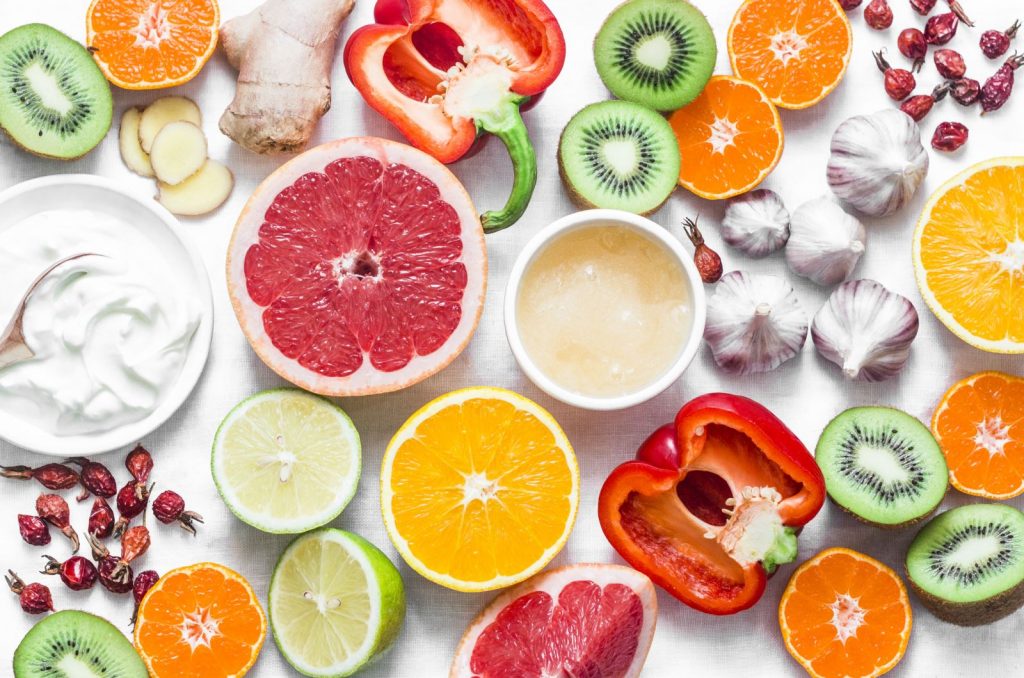
How to Boost Your Immune System by Eating Healthier
It’s important to do your best to eat healthy foods as much as possible on a daily basis, but it’s especially important during stressful times. When we’re stressed, the body’s immune system is weakened because it’s unable to fight off foreign bodies (antigens), such as bacteria, viruses, and cancerous cells.
The body’s No. 1 defense against viruses isn’t fear, it’s having a healthy immune system, which you can control. Here are some of the fruits, vegetables, and other healthy foods you can be eating right now to promote a healthy immune system (plus, you’ll feel better!).
CITRUS FRUITS AND BERRIES
Citrus fruits, such as grapefruits, oranges, and tangerines, are loaded with Vitamin C, which helps to heal cuts and wounds and keeps teeth and gums healthy. They also contain folate and potassium, which can help normalize blood pressure. Citrus fruits are also a great source of Vitamin B, which can reduce migraine headaches and improve the appearance of skin, hair, and nails.
VITAMINS C AND D
One cup of fortified orange juice naturally provides 100% of your Daily Value (DV) for vitamin C, an antioxidant vitamin that plays a primary role in keeping the immune system healthy, as well as 25% DV for vitamin D. A research study in 2017 shows vitamin D may reduce the risk for viral infections, including respiratory tract infections, by reducing production of pro-inflammatory compounds in the body.
Berries, such as blueberries, raspberries, and strawberries, contain antioxidants, which have anti-aging benefits, help to reduce memory loss and keep urinary tracts healthy. Berries are also a diabetes superfood because they’re packed with antioxidants, vitamins, and fiber and are low-carb. Despite their sugar content, many berries can safely be counted as a serving of fruit for people with diabetes.
BELL PEPPERS
While citrus fruits are good sources of vitamin C, surprisingly, a red or yellow bell pepper is an even better source! A medium red bell pepper has more than twice as much vitamin C as a medium orange. Plus, bell peppers are packed with the antioxidant beta-carotene. Toss slices in a salad, stir-fry with other veggies, or use to dip hummus in place of pita bread.
BROCCOLI AND POTATOES
Broccoli is high in fiber and provides immune-system-boosting Vitamin C, bone-strengthening Vitamin K, and Vitamin A. Eating broccoli can help prevent colon cancer, lower risk for cataracts, and also reduces inflammation, lowering the risk of stroke and heart disease.
Fortunately, we live in Idaho and eating potatoes are one of the richest sources of starch, vitamins, minerals and dietary fiber you can find. Fresh potato along with its skin is a good source of Vitamin C and contain many essential minerals like iron, manganese, magnesium, phosphorous, copper and potassium.
EGGS
Eating enough protein each day is important to support the immune system, and eggs are a great way to do this since they also contain nutrients like vitamin D, zinc, selenium, and vitamin E that the body needs for proper immune functioning. Whole eggs are among the most nutritious foods on the planet, containing a little bit of almost every nutrient you need.
YOGURT
Eating yogurt with minimal added sugar and “active, live cultures” is an easy way to support immune health. Yogurt’s benefits come from the probiotics, or good bacteria. Research suggests the immune system and microbiome work with one another to target pathogens and to fine-tune immune responses. Enjoying yogurt also provides you with impressive amounts of protein, calcium, B vitamins, phosphorus, magnesium, and potassium, which help to regulate blood pressure, metabolism, and bone health.
HOW MANY FRUITS AND VEGETABLES SHOULD YOU BE EATING ON A DAILY BASIS?
On average, an adult should try to eat at least 2 cups of fruit and 2 ½ cups of vegetables on a daily basis. One cup of fruit can equal a small apple, a cup of applesauce, one banana, a medium-sized grapefruit, or eight strawberries. One cup or 8 ounces of fruit can also be a cup of 100 percent fruit juice or ½ cup of dried fruit. One cup of raw or cooked vegetables or vegetable juice, or 2 cups of raw leafy greens can be considered as 1 cup from the vegetable group.
Remember: fruits and vegetables are convenient and nutritious in any form—fresh, frozen, canned, or dried.
Our content is reviewed regularly and is updated when new and relevant evidence is made available. This information is neither intended nor implied to be a substitute for professional medical advice. Always seek the advice of your physician or other qualified health provider prior to starting any new treatment or with questions regarding a medical condition.



